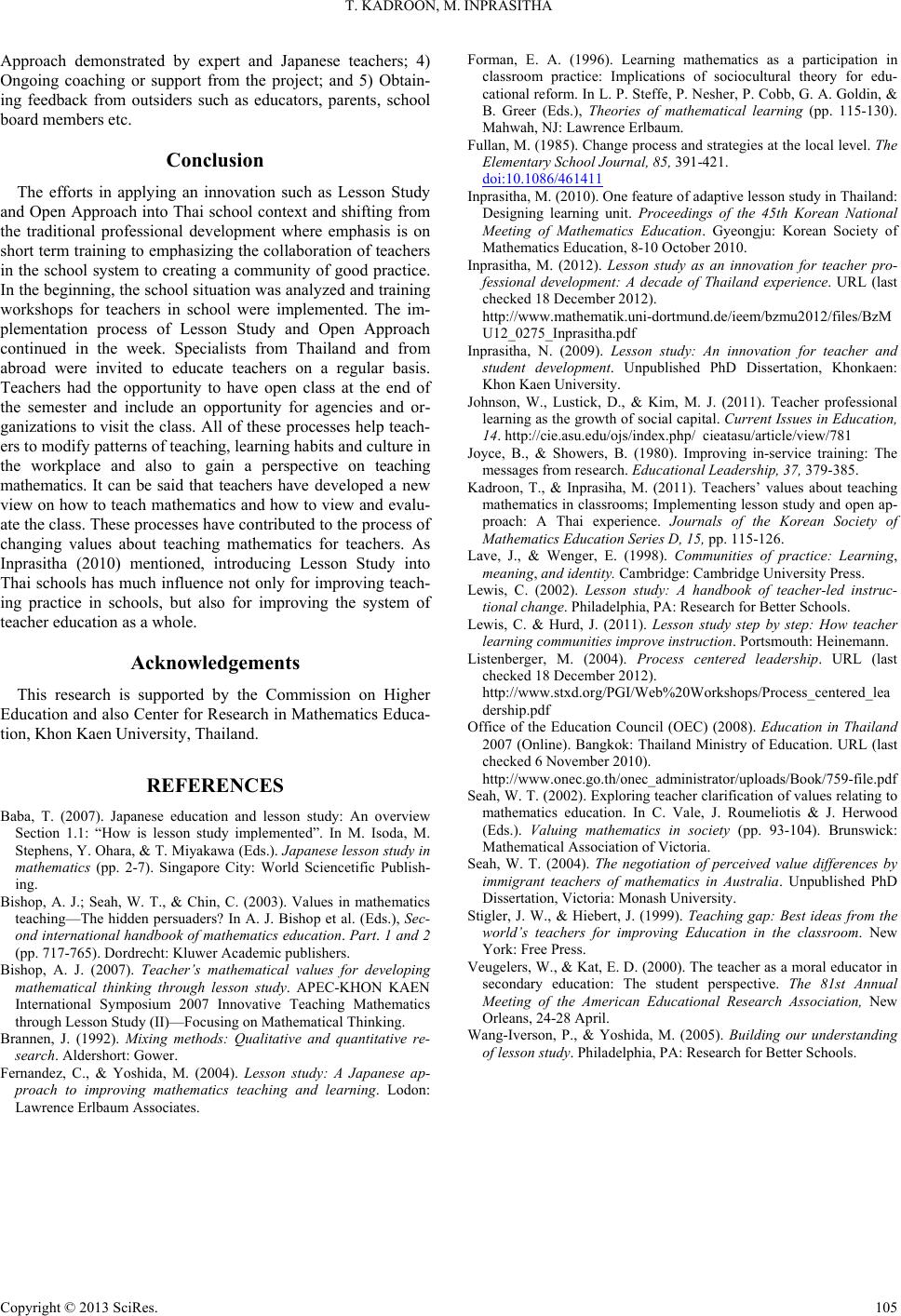
T. KADROON, M. INPRASITHA
Approach demonstrated by expert and Japanese teachers; 4)
Ongoing coaching or support from the project; and 5) Obtain-
ing feedback from outsiders such as educators, parents, school
board members etc.
Conclusion
The efforts in applying an innovation such as Lesson Study
and Open Approach into Thai school context and shifting from
the traditional professional development where emphasis is on
short term training to emphasizing the collaboration of teachers
in the school system to creating a community of good practice.
In the beginning, the school situation was analyzed and training
workshops for teachers in school were implemented. The im-
plementation process of Lesson Study and Open Approach
continued in the week. Specialists from Thailand and from
abroad were invited to educate teachers on a regular basis.
Teachers had the opportunity to have open class at the end of
the semester and include an opportunity for agencies and or-
ganizations to visit the class. All of these processes help teach-
ers to modify patterns of teaching, learning habits and culture in
the workplace and also to gain a perspective on teaching
mathematics. It can be said that teachers have developed a new
view on how to teach mathematics and how to view and evalu-
ate the class. These processes have contributed to the process of
changing values about teaching mathematics for teachers. As
Inprasitha (2010) mentioned, introducing Lesson Study into
Thai schools has much influence not only for improving teach-
ing practice in schools, but also for improving the system of
teacher education as a whole.
Acknowledgements
This research is supported by the Commission on Higher
Education and also Center for Research in Mathematics Educa-
tion, Khon Kaen University, Thailand.
REFERENCES
Baba, T. (2007). Japanese education and lesson study: An overview
Section 1.1: “How is lesson study implemented”. In M. Isoda, M.
Stephens, Y. Ohara, & T. Miyakawa (Eds.). Japanese lesson study in
mathematics (pp. 2-7). Singapore City: World Sciencetific Publish-
ing.
Bishop, A. J.; Seah, W. T., & Chin, C. (2003). Values in mathematics
teaching—The hidden persuaders? In A. J. Bishop et al. (Eds.), Sec-
ond international handbook of mathematics education. Part. 1 and 2
(pp. 717-765). Dor drecht: Kluwer Academic publishers.
Bishop, A. J. (2007). Teacher’s mathematical values for developing
mathematical thinking through lesson study. APEC-KHON KAEN
International Symposium 2007 Innovative Teaching Mathematics
through Lesson Study (II)—Focusing on Mathematical Thinking.
Brannen, J. (1992). Mixing methods: Qualitative and quantitative re-
search. Aldershort: Gower.
Fernandez, C., & Yoshida, M. (2004). Lesson study: A Japanese ap-
proach to improving mathematics teaching and learning. Lodon:
Lawrence Erlbaum Associates.
Forman, E. A. (1996). Learning mathematics as a participation in
classroom practice: Implications of sociocultural theory for edu-
cational reform. In L. P. Steffe, P. Nesher, P. Cobb, G. A. Goldin, &
B. Greer (Eds.), Theories of mathematical learning (pp. 115-130).
Mahwah, NJ: Lawrence Erlbaum.
Fullan, M. (1985). Change process and strategies at the local level. The
Elementary School Journal, 85, 391-421.
doi:10.1086/461411
Inprasitha, M. (2010). One feature of adaptive lesson study in Thailand:
Designing learning unit. Proceedings of the 45th Korean National
Meeting of Mathematics Education. Gyeongju: Korean Society of
Mathematics Education, 8-10 October 2010.
Inprasitha, M. (2012). Lesson study as an innovation for teacher pro-
fessional development: A decade of Thailand experience. URL (last
checked 18 December 2012).
http://www.mathematik.uni-dortmund.de/ieem/bzmu2012/files/BzM
U12_0275_Inprasitha.pdf
Inprasitha, N. (2009). Lesson study: An innovation for teacher and
student development. Unpublished PhD Dissertation, Khonkaen:
Khon Kaen University.
Johnson, W., Lustick, D., & Kim, M. J. (2011). Teacher professional
learning as the growth of social capital. Current Issues in Education,
14. http://cie.asu.edu/ojs/index.php/ cieatasu/article/view/781
Joyce, B., & Showers, B. (1980). Improving in-service training: The
messages from research. Educational Leadership, 37, 379-385.
Kadroon, T., & Inprasiha, M. (2011). Teachers’ values about teaching
mathematics in classrooms; Implementing lesson study and open ap-
proach: A Thai experience. Journals of the Korean Society of
Mathematics Education Series D , 15, pp. 115-126.
Lave, J., & Wenger, E. (1998). Communities of practice: Learning,
meaning, and identity. Cambridge: Cambridge University Press.
Lewis, C. (2002). Lesson study: A handbook of teacher-led instruc-
tional change. Philadelphia, PA: Research for Better Schools.
Lewis, C. & Hurd, J. (2011). Lesson study step by step: How teacher
learning communities improve instruction. Portsmouth: Heinemann.
Listenberger, M. (2004). Process centered leadership. URL (last
checked 18 December 2012).
http://www.stxd.org/PGI/Web%20Workshops/Process_centered_lea
dership.pdf
Office of the Education Council (OEC) (2008). Education in Thailand
2007 (Online). Bangkok: Thailand Ministry of Education. URL (last
checked 6 November 2010).
http://www.onec.go.th/onec_administrator/uploads/Book/759-file.pdf
Seah, W. T. (2002). Exploring teacher clarification of values relating to
mathematics education. In C. Vale, J. Roumeliotis & J. Herwood
(Eds.). Valuing mathematics in society (pp. 93-104). Brunswick:
Mathematical Association of Victoria.
Seah, W. T. (2004). The negotiation of perceived value differences by
immigrant teachers of mathematics in Australia. Unpublished PhD
Dissertation, Victoria: Monash University.
Stigler, J. W., & Hiebert, J. (1999). Teaching gap: Best ideas from the
world’s teachers for improving Education in the classroom. New
York: Free Press.
Veugelers, W., & Kat, E. D. (2000). The teacher as a moral educator in
secondary education: The student perspective. The 81st Annual
Meeting of the American Educational Research Association, New
Orleans, 24-28 April.
Wang-Iverson, P., & Yoshida, M. (2005). Building our understanding
of lesson study. Philadelph i a , PA: Research for Bett e r S c h o ol s .
Copyright © 2013 SciRes. 105